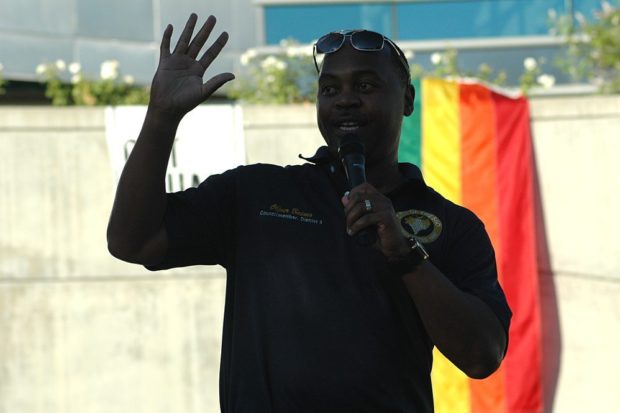
By Richard Stone

Oliver Baines is the Fresno City Council Member for District 3, which encompasses some of the Tower District, downtown and West Fresno. Meeting him in his City Hall office, I was struck by his easy, yet professional, manner of speech and demeanor, responsive and focused. Though relatively young and just completing his first term, he seemed comfortable with, and serious about, the responsibilities he has assumed.
Baines says he was moved to run for office by the challenge of acquaintances in answer to his frequent complaints about city government. When he thought deeply about what he could “do about it,” running for the City Council came up, though he was a political neophyte.
“I’m born and bred an optimist. I believed in myself and my possibilities—though in truth when my campaign manager called at 8:05 election night and said I’d won the runoff [with former Council Member Mike Briggs], it didn’t seem real. And I was very humbled at being given the trust of the voters.”
Baines describes himself as non-ideological, approaching issues case by case, as realistically and factually as possible. He says, “The right decision is not always the obvious one. I need to take time to study an issue from several perspectives, before coming to a conclusion.”
He knows well the history of exploitation and despoliation of much of his district by unregulated development and disproportionate allocation of city funds. “But,” he says, “it took five decades to create the situation; I don’t expect to rectify it quickly.”
Rather than pointing to any specific “wins” during his time in office, he believes what he’s helped accomplish is greater community cohesion and increased ability for constituents to successfully communicate problems to the city and to have a substantive voice in planning and economic development.
His mantra seems to be “strengthening neighborhoods,” and he is pleased with the sustained focus on the areas surrounding downtown and the General Plan emphasis on “infill.” He says, “We will never completely stop the city’s expansion, but if we adhere to the General Plan, we will build a much more viable city.”
Baines feels fortunate in having the active support of community groups such as the Golden Westside Planning Committee, Building Healthy Neighborhoods and Building Neighborhood Capacity; and in being part of a City Council whose members are collegial and respectful of each other.
He says, that much to his surprise, land-use issues are at the center of city governance, and the current Council members understand that having a unified codified vision for development is a priority. “So many plans have come and gone without being formally adopted and without code specifications to protect neighborhoods.” Baines also is committed to developing a comprehensive transportation plan that enables mixed modes of travel and connects all parts of the city.
Here are his answers to questions about some specific issues:
- Measure G (the proposed prioritization of garbage pickup): “The mayor never made the case that it was needed or
fiscally sound. People did not want the imposition of a business model on government; they wanted fairness and good planning.” - Strong mayor model of city governance: “ It seems designed to slow down the process and create conflict. This can be good, but sometimes it doesn’t serve the public—a less-divisive decision-making process might be better. In the end, though, it depends more on who’s in office than how the rules are drawn up. I do feel that at least the current Council and Mayor’s office respect each other.”
- Police oversight: “As a former police officer, I know that sometimes outside oversight is beneficial. I like what [current Police Oversight Officer] Rick Rasmussen is doing, but he doesn’t have the power to do the job that’s needed. The public still has no real access to the process of review. But this is simply not a priority topic right now.”
- Fulton Mall: “At present, I’m persuaded that opening the mall to traffic is a worthwhile avenue for trying to improve the economy downtown.” [Author’s note: I urged Baines to read the November issue of the Community Alliance for cogent counterarguments. He said he would.]
- City/County disputes: “The philosophy and practices of government for urban and rural area are significantly different. I’ve sat on the committee looking at joint activity, and there seems too little held in common.”
What does Baines value most about Fresno? The answer, he says, came late and unexpectedly. Raised in Los Angeles, when he first came to Fresno for college, he was put off by its slow pace and lack of excitement. “But I’ve discovered this is not a small town, it’s a major urban center, and I’ve grown to appreciate having a lot of a city’s amenities while living in a place that feels safe and calm. That’s what my grandparents told me when I first came, and now I believe they’re right.”
*****
Richard Stone is on the boards of the Fresno Center for Nonviolence and the Community Alliance and author of the forthcoming book, Hidden in Plain Sight. Contact him at richard2662559@yahoo.com.
